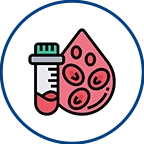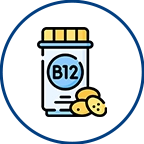Gynecomastia

Gynecomastia is a condition characterized by the enlargement of breast tissue in males. It can affect one or both breasts, leading to swelling, tenderness, and sometimes pain. Gynecomastia is relatively common and can occur at any age, from infancy to adulthood. While it is not usually a serious medical condition, it can cause emotional distress and affect self-confidence. Understanding the causes, symptoms, and available treatment options can help individuals affected by gynecomastia make informed decisions about their health.
Home Sample Collection
What causes gynecomastia?
Gynecomastia is often caused by an imbalance between the hormones estrogen and testosterone. While estrogen promotes breast tissue growth, testosterone regulates it. Various factors can disrupt this balance, including puberty, hormonal changes in aging men, certain medications (e.g., anabolic steroids, anti-androgens), medical conditions (e.g., liver or kidney disease, hypogonadism), and lifestyle factors (e.g., obesity, excessive alcohol consumption).
Is gynecomastia a serious condition?
Gynecomastia itself is not considered a serious medical condition and does not increase the risk of developing breast cancer. However, it can cause emotional distress and affect self-esteem. In some cases, gynecomastia may be a sign of an underlying medical condition, so it is important to consult a healthcare professional for a proper evaluation.
What are the symptoms of gynecomastia?
The primary symptom of gynecomastia is the enlargement of breast tissue. This can vary in severity, ranging from a small, firm lump to more extensive breast enlargement. Gynecomastia may also be accompanied by tenderness or pain in the breasts.
How is gynecomastia diagnosed?
Gynecomastia is typically diagnosed through a physical examination and medical history evaluation. Additional tests, such as blood tests and imaging studies, may be recommended to determine the underlying cause and rule out other conditions.
Can gynecomastia go away on its own?
In some cases, gynecomastia may resolve on its own, particularly if it is due to temporary hormonal imbalances during puberty. However, in many cases, medical intervention may be necessary to alleviate symptoms and address the underlying cause.
What treatment options are available for gynecomastia?
The treatment of gynecomastia depends on the underlying cause and the severity of the condition. In some cases, lifestyle modifications, such as weight loss and avoiding certain medications or substances, may be sufficient. In more severe cases, surgical intervention, such as liposuction or mastectomy, may be recommended.
Are there any non-surgical treatments for gynecomastia?
In certain cases, medication may be prescribed to treat gynecomastia. For example, selective estrogen receptor modulators (SERMs) can help reduce breast tissue growth. However, the use of medication should be discussed with a healthcare professional and closely monitored.
Is gynecomastia preventable?
While it may not be possible to prevent all cases of gynecomastia, certain lifestyle choices can help reduce the risk. This includes maintaining a healthy weight, avoiding the use of anabolic steroids, and moderating alcohol consumption.
Can gynecomastia recur after treatment?
Gynecomastia can recur in some cases, particularly if the underlying cause is not fully addressed. It is important to follow the recommended treatment plan and continue regular check-ups with a healthcare professional to monitor any changes or potential recurrence.
When should I consult a healthcare professional about gynecomastia?
If you notice breast enlargement or any changes in your breast tissue, it is important to consult a healthcare professional for evaluation and diagnosis. They can help determine the underlying cause and recommend appropriate treatment options tailored to your specific needs.
Book Your Slot
Our Locations Near You in Hyderabad
3KM from Banjara Hills
1.9KM from Yusufguda
3KM from Madhura Nagar
5KM from Shaikpet
Profiles
- Cardiac Risk Profile
- Pituitary marker Profile
- Rheumatoid Arthritis Profile
- Dengue Fever Panel
- Lung Cancer Panel 1 Complete Molecular
- Gastroenteritis Screening Panel
- Thyroid Profile (T3,T4,TSH), Serum
- Pancreatic Marker Profile
- STD profile
- Androgen Profile
- Lipid Profile, Serum
- Pancreatic(acute)Profile
- PCOD Profile
Radiology
Pathology Tests
- Glucose Fasting (FBS),Sodium Fluoride Plasma
- Creatinine, Serum
- Glycosylated Hemoglobin (HbA1C)
- Vitamin B12 (Cyanocobalamin), Serum
- Thyroid Stimulating Hormone (TSH) Ultrasensitive, Serum
- Complete Urine Examination (CUE), Urine
- Liver Function Test (LFT),Serum
- Dengue (IgG & IgM), Serum
- Dengue Antigen (Ns1) Rapid, Serum
- C-Reactive Protein (CRP), Serum
- Widal (Slide Method), Serum
- Total IgE, Serum




